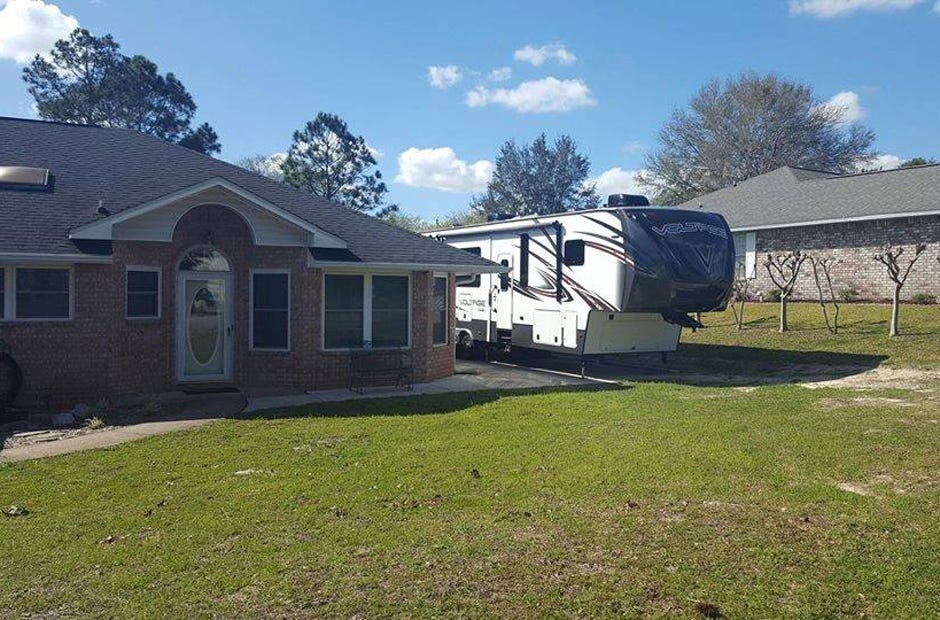![The camper on Andrew Rencich's property was deemed a violation of city code and could cost him up to $500 per day if not removed. [MARK JUDSON/NEWS BULLETIN]](http://127.0.0.1/wordpress/wp-content/uploads/2022/01/ghows-DA-4c4ab0ca-b448-4d56-e053-0100007fd734-c157e1eb.jpeg)
CRESTVIEW—A recently enforced city code on certain vehicles concerns some Crestview residents.
The rule prohibits trailers, including recreational vehicles and campers, over 24 feet in length from being stored on the property or having utility services connected to it. Vehicles or trailers larger than that must be stored off-property.
The code has been on the books since 1999 but was largely forgotten until notices appeared on residents’ doors.
‘WHY SHOULD I LIVE HERE?’
“Having (a recreational vehicle) is a big investment for me and I want to keep that in my sight,” said Mark Kania, one of several Crestview residents notified their RV violates the city code.
“I understand the intent of the law but there’s nothing to protect people that use them for recreation,” Kania said, adding he believes the rule is in place to prevent people from living in the trailers and making neighborhoods appear cluttered.
Kania, and others like him, don’t use their RV for permanent living but still received citations. He and his wife, Maria, take their trailer to Alabama each month for recreational camping — a hobby the couple isn’t willing to give up.
Not only does he prefer to keep the vehicle in sight for its safety, but the RV also requires humidifying when not in use — something the current code prohibits. Black mold could develop in the unit if left to sit in the elements, Kania said.
“If the code isn’t written properly, then why should I live here?” Kania said. He’s willing to move outside city limits to avoid fines — which can range from $250 to $500 each day — or having to store his camper away from his property and risk damage.
Currently, Kania has put a hold on upgrade projects for his house. He’s hesitant to put further time and investment into the home if he decides to move.
‘IT’S NOT UP TO CRESTVIEW’
Andrew Rencich received a notice to remove his RV by April 10, or face fines.
Rencich, a Crestview business owner and a military service member, has become a voice for the group of residents opposing the code. He spoke at a City Council meeting in March and has launched a Facebook page to help inform residents of the code and an upcoming meeting concerning it.
Kania and Rencich both believe the code entangles the municipal government in civil affairs.
“I believe in small government and that it shouldn’t get involved in civil matters,” Kania said. “These are disputes that should be handled between neighbors unless it presents a matter of public health or safety. It’s not up to Crestview to enforce its own version of a [homeowners association] in the city.”
‘WE MUST AMEND THIS ORDINANCE’
When Kania addressed the City Council March 13, several council members agreed the ordinance should be reviewed and adjusted accordingly.
“I think we must amend this ordinance,” Councilman Joe Blocker said. He, too, cited the need for RVs and campers to be connected to power to prevent mold.
Councilman J.B. Whitten believed the code was outdated and said he was in favor of reviewing that portion of the ordinance.
The RV topic will be discussed 6 p.m. April 10 at Council Chambers in City Hall.
The agenda for Monday’s meeting lists six speakers regarding the code, including Kania. Rencich has said he will also speak during an open forum period when any member of the public can comment before the council.
Aside from Facebook, Rencich has also used the neighborhood-based social network, Nextdoor, to address the issue. Currently, about 60 comments have been made in the RV ordinance discussion. He expects about 20 people to attend the City Council meeting to show support for amending the ordinance.
“Some people who I’ve heard from aren’t even RV owners but they’re concerned that the city can tell its residents what they can and can’t keep on their own property,” Rencich said.
THE HOA FACTOR
An adjustment to the city code might not alleviate issues for all residents. Some, like Rencich, are prohibited from storing campers on their property by a housing covenant. These matters are often addressed by consulting the respective HOA — if one exists.
Rencich lives in a neighborhood that never formed an HOA after its development. Regardless, the terms of a covenant are still in place in most scenarios, according to Growth Manager Teresa Gaillard.
City Attorney Ben Holley advised individuals to speak with an attorney to review the validity and enforcement of a covenant with no HOA.
A restrictive covenant is of little concern to Rencich; his focus remains on adjusting or removing the city code.
Possible changes could take weeks or even months to take effect, leaving those with warnings to question if they will receive fines.
Violations will have to be reviewed along with the ordinance during the City Council meeting, according to Whitten. The council will then address the situation, he added.
THE ISSUE: A city code prohibits storage of camping trailers over 24 feet in length at a private residence.
LOCAL IMPACT: Violators could face hundreds of dollars in fines per day. In addition, residents question how much say municipal government can or should have in civil matters.

This article originally appeared on Crestview News Bulletin: Ordinance raises recreational vehicle owners' concerns
